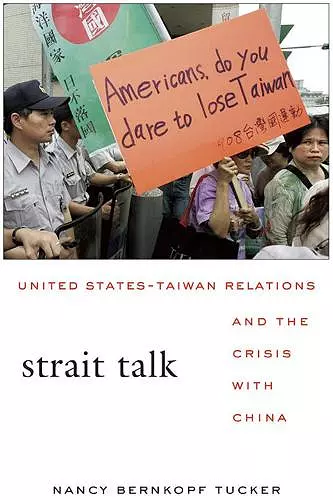Strait Talk
United States-Taiwan Relations and the Crisis with China
Format:Paperback
Publisher:Harvard University Press
Published:17th Apr '11
Currently unavailable, and unfortunately no date known when it will be back

An important work that will make a strong impact and be widely read. Tucker argues that relations between the U.S. and Taiwan, and between the U.S. and China, are difficult today because successive American administrations knowingly created expectations in Taipei and Beijing that could not be met. She concludes that real progress in these relationships will require the United States to build trust. This book should provoke introspection in Washington, and will help readers everywhere understand this complex relationship. -- Shelley Rigger, author of Politics in Taiwan: Voting for Democracy A signal contribution to an understanding of the desperately complex diplomatic history of Taiwan and the United States, this will become the 'go-to' book on the cross-Taiwan Strait problem. -- Alan M. Wachman, author of Why Taiwan? Geostrategic Rationales for China's Territorial Integrity For nearly six decades, Taiwan has bedeviled U.S. foreign policy in East Asia, complicated the U.S. relationship with the People's Republic of China, and generated domestic passions of unusual intensity. Tucker provides a detailed and fascinating look at the policies and people, the mistakes and triumphs that have shaped U.S. relations with Taiwan. Readers will emerge with a far better appreciation of the reasons why she points to confrontation in the Taiwan Strait as 'the single most dangerous challenge for the United States in the world.' -- J. Stapleton Roy, former U.S. ambassador to China
Relations among the United States, Taiwan, and China challenge policymakers, international relations specialists, and a concerned public to examine their assumptions about security, sovereignty, and peace. Tucker traces the thorny relationship between the United States and Taiwan as both watch China’s power grow.
Relations among the United States, Taiwan, and China challenge policymakers, international relations specialists, and a concerned public to examine their assumptions about security, sovereignty, and peace. Only a Taiwan Straits conflict could plunge Americans into war with a nuclear-armed great power. In a timely and deeply informed book, Nancy Bernkopf Tucker traces the thorny relationship between the United States and Taiwan as both watch China’s power grow.
Although Taiwan–U.S. security has been intertwined since the 1950s, neither Taipei nor Washington ever fully embraced the other. Differences in priorities and perspectives repeatedly raised questions about the wisdom of the alignment. Tucker discusses the nature of U.S. commitments to Taiwan; the intricacies of policy decisions; the intentions of critical actors; the impact of Taiwan’s democratization; the role of lobbying; and the accelerating difficulty of balancing Taiwan against China. In particular, she examines the destructive mistrust that undermines U.S. cooperation with Taiwan, stymieing efforts to resolve cross-Strait tensions.
Strait Talk offers valuable historical context for understanding U.S.–Taiwan ties and is essential reading for anyone interested in international relations and security issues today.
An important work that will make a strong impact and be widely read. Tucker argues that relations between the U.S. and Taiwan, and between the U.S. and China, are difficult today because successive American administrations knowingly created expectations in Taipei and Beijing that could not be met. She concludes that real progress in these relationships will require the United States to build trust. This book should provoke introspection in Washington, and will help readers everywhere understand this complex relationship. -- Shelley Rigger, author of Politics in Taiwan: Voting for Democracy
A signal contribution to an understanding of the desperately complex diplomatic history of Taiwan and the United States, this will become the 'go-to' book on the cross-Taiwan Strait problem. -- Alan M. Wachman, author of Why Taiwan? Geostrategic Rationales for China's Territorial Integrity
For nearly six decades, Taiwan has bedeviled U.S. foreign policy in East Asia, complicated the U.S. relationship with the People's Republic of China, and generated domestic passions of unusual intensity. Tucker provides a detailed and fascinating look at the policies and people, the mistakes and triumphs that have shaped U.S. relations with Taiwan. Readers will emerge with a far better appreciation of the reasons why she points to confrontation in the Taiwan Strait as 'the single most dangerous challenge for the United States in the world.' -- J. Stapleton Roy, former U.S. ambassador to China
Although Washington's Taiwan policy has been outwardly clear and consistent since 1972--defined by the so-called communiqué framework and the Taiwan Relations Act--Tucker shows that the actual negotiation record from Richard Nixon to George W. Bush was rife with confusion and mistrust. She focuses on the less-studied Washington-Taipei leg of the Beijing-Washington-Taipei triangle, tracing the interaction of policies and personalities with a level of detail made possible by extensive interviews and archival research and with a clarity of judgment made possible by a long familiarity with most of the protagonists. Tucker acknowledges that U.S. grand strategy during this time enjoyed some successes: China became a counterweight to the Soviet Union, and Taiwan survived. But she argues that the United States repeatedly yielded more to China than it had to, and the shoddy way it treated Taiwan created a legacy of mistrust not only in Taipei but also among allies throughout the region. -- Andrew J. Nathan * Foreign Affairs *
- Nominated for Arthur Ross Book Award 2010
- Nominated for Lionel Gelber Prize 2010
- Nominated for J. David Greenstone Book Prize 2010
ISBN: 9780674060524
Dimensions: unknown
Weight: unknown
404 pages